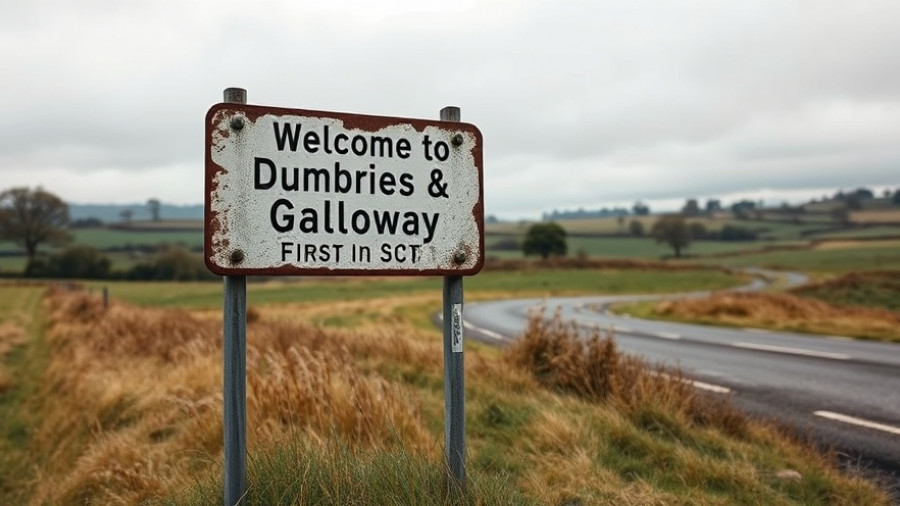
Tourist Tax Debate Heats Up in Dumfries and Galloway
In a united front, leaders from the hospitality, tourism, and wedding sectors in Dumfries and Galloway (D&G) are firmly opposing a proposed Transient Visitor Levy (TVL), commonly dubbed a ‘tourist tax.’ Their collective voice comes at a pivotal time when local businesses are still grappling with the repercussions of a challenging economic climate.
The open letter, directed to Councillor Stephen Thompson and the Dumfries & Galloway Council, outlines the potential adverse effects that the levy could impose on local life. Businesses argue that this tax not only penalizes visitors but also burdens residents who may seek accommodation locally for various purposes, including healthcare appointments.
As highlighted by Stephen Montgomery, Scottish Hospitality Group Director, D&G’s tourist economy is heavily reliant on its appeal to seasonal visitors. Imposing a tax that could drive up prices risks diminishing the region's competitiveness against neighboring destinations like Carlisle, which do not impose such levies. The repercussions could be severe, affecting the livelihoods of the 7,000 direct jobs supported by this sector.
The Local Perspective on Visitor Levies
Matthew Wallace Jr., director at the Cairndale Hotel and Spa, echoed the sentiment against the visitor tax, stating emphatically, "Dumfries and Galloway does not need a visitor levy." He reiterated that other areas with high tourism pressures, such as Edinburgh and Glasgow, might find such measures effective due to their larger visitor volumes and more robust economies. However, for a rural region like D&G, where tourism is diverse yet fragile, even a minor tax could detract significantly from attracting visitors.
Wallace's concerns reflect a shared anxiety in the local business community. He warned that implementing a levy could just be the start of larger taxes under the pretext of tourism development. He encourages the DGC to seek alternative revenue sources that will not further exacerbate the financial strains faced by small businesses.
Partnership for Growth: An Alternative Approach
Instead of implementing a tax, key business leaders advocate for strategic investment in existing tourism infrastructure and a collaborative approach to marketing. They believe that the council can work effectively with local businesses to promote Dumfries and Galloway as an attractive destination without placing an additional financial burden on visitors or residents.
John Holliday, Executive Chairman of Gretna Green Ltd., joined the chorus of concern, branding the proposed tax as “a tax on visitors, businesses, and local jobs.” The stark contrast in visitor numbers between busy cities and rural areas like D&G underscores the inappropriateness of such a tax measure in this context. As these leaders highlight, it is more crucial than ever to promote sustainable tourism methods that will support growth, rather than implement taxes that may drive visitors away.
Community Resilience Amidst Change
The conversation surrounding the tourist tax in Dumfries and Galloway illuminates a broader issue affecting rural economies throughout Scotland. Industry voices like Fiona Campbell of the Association of Scotland’s Self-Caterers are calling for thoughtful dialogue, emphasizing the economic and cultural importance of the small operators who are the backbone of D&G's tourism.
There’s an undeniable community spirit in Dumfries and Galloway, reinforcing the idea that local businesses are champions of sustainable tourism practices. By focusing on enhancing the visitor experience through creative partnerships and leveraging existing resources, leaders feel confident that the region can thrive without resorting to punitive measures.
Looking Ahead: Engaging with Local Concerns
With local leaders rallying against the levy, the next steps for Dumfries and Galloway Council are critical. Early engagement and widespread consultation with the business community can pave the way for a decision that reflects the aspirations and realities of both residents and visitors. The council ultimately holds the reins in ensuring that Dumfries and Galloway remains an inviting destination, cherished by tourists and locals alike.
In conclusion, the push against the proposed tourist tax embodies the spirit of community resilience and the need to listen to local voices. As Dumfries and Galloway navigates the complexities of tourism policy, it’s imperative to strike a balance that nurtures both economic growth and the well-being of its residents.
 Add Row
Add Row  Add
Add 





Write A Comment